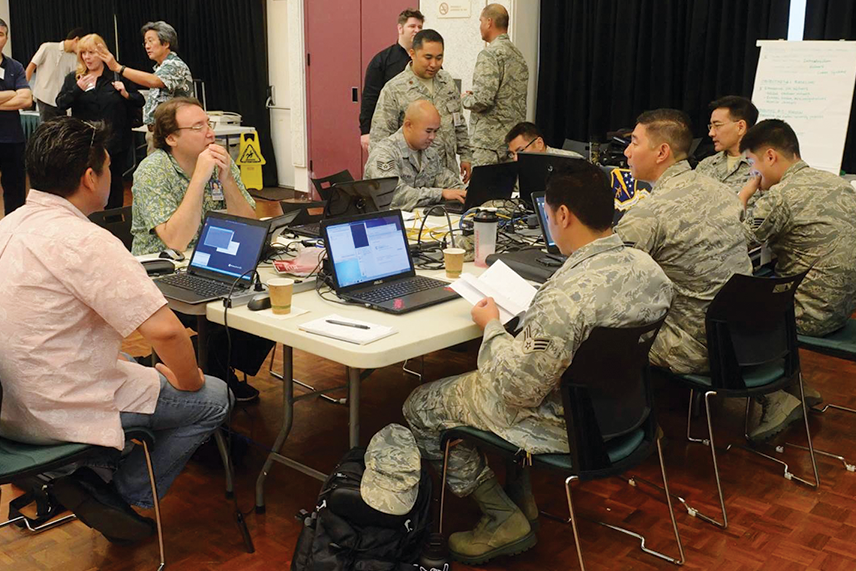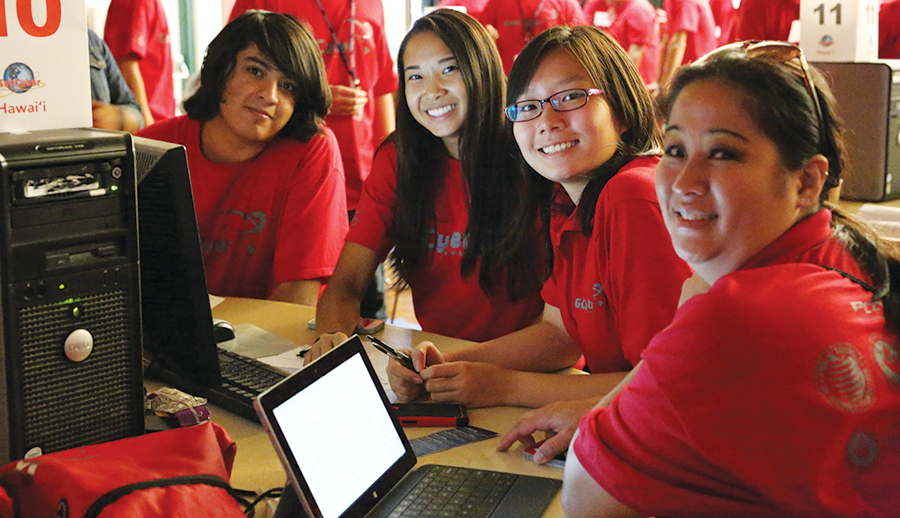Cultivating Hawai‘i’s Cyber Ecosystem
Sony Pictures, JPMorgan Chase, Anthem, Target, Yahoo!
These companies are symbols of everyday corporate America—large, successful, financially sound and secure. However, events occurring in recent years have shown that even these pillars of corporate America are susceptible and vulnerable to sophisticated cyberattacks that have exposed personal, financial and other types of information affecting the companies and millions of households.
Cyber threats are among the gravest national security dangers to the United States—as citizens and those in the private sector and government are increasingly confronted by a range of actors attempting to do harm through identify theft, cyber-enabled economic espionage, politically motivated cyberattacks and other malicious activity. It is also one of the most strategic threats that federal, state and private sector industries face in Hawai‘i. Operation-critical systems in every sector have a dependency on cyber, which expands capacity and range of capability—but also introduces new and evolving forms of vulnerabilities that threaten the security infrastructure.
While these corporations and organizations are expanding their cybersecurity efforts, they are also facing an increasing shortage of information security professionals worldwide. According to recent results from the Global Information Security Workforce Study, employers can expect a cybersecurity workforce shortage of 1.8 million by 2022.
In an effort to help mitigate some of the threat from this double-edge sword, the University of Hawai‘i is spearheading efforts with local federal, state, county, private industry, professional organizations and academia to plan, develop and implement a “cyber-ecosystem” to be known as CyberHawai‘i. The purpose of CyberHawai‘i will be to coordinate and support cyberactivities related to readiness and resilience, education and workforce development, economic development and innovation throughout the state.
“By bringing together like-minds, sharing ideas and resources, and building upon the collective energies and efforts, Hawai‘i will be able to build a strong and resilient cyber community,” said UH Vice President for Research and Innovation Vassilis L. Syrmos. “CyberHawai‘i will enable all sectors to be better positioned to defend and withstand cyber attacks and at the same time—help to grow cyber-related innovation and jobs to fuel and sustain a new economic sector in the state.
A significant component of the CyberHawai‘i partnership will be the establishment of the UH Center for Applied Cybersecurity, a virtual center that will incorporate many of UH’s cybersecurity research, education and workforce development activities already established under its existing Hawai‘i cybersecurity workforce initiative. The aim of the new center will be to combine basic principles of cybersecurity with the practical skills and hands-on experience necessary in exploiting and protecting these systems.
The University of Hawai‘i has participated in and hosted a number of high-profile cybersecurity exercises, including the Maritime Cybersecurity Exercise conducted by the U.S. Coast Guard Section Honolulu in January 2015 and the annual Po‘oihe Cyber Defense Exercise conducted by the Department of Defense. Since 2015, UH has partnered with the National Security Agency (NSA), the National Science Foundation and the University of Alaska to host GenCyber Hawai‘i, a free week-long summer camp for high school students and teachers designed to help encourage STEM pathways in cybersecurity. The event is held at Honolulu Community College’s Pacific Center for Advanced Technology Training (PCATT).

“Our purpose is to develop a clear education pathway into the cybersecurity profession by charting academic requirements to industry certifications and mapping out the knowledge and skills required for the various positions in the cybersecurity field”, said Steve Auerbach, director of PCATT. “Students need to be introduced and exposed to cybersecurity as a potential career early in their primary and secondary education to ensure that they have the appropriate math and science background to pursue a postsecondary degree in cybersecurity.”
Additionally, UH is also home to three designated NSA designated Centers of Academic Excellence in Cyber Defense & Research at the University of Hawai‘i at Mānoa, Honolulu Community College and at the University of Hawai‘i at West Oʻahu. These prestigious designations represent UH’s commitment to provide cutting-edge research and education in cybersecurity.
“This designation is demonstrative of the quality and substance of the education the University of Hawai‘i has to offer, and more importantly underscores justification for additional grant and research capacity to be brought to bear on information assurance and cybersecurity related curricula,” stated Captain Cliff Bean, former commander of National Security Agency/Central Security Service Hawai‘i. “Increasing the number of students majoring in science, technology, engineering and mathematics (STEM) related fields is critical to federal government agencies, the State of Hawai‘i, local industry and businesses.”
CyberHawai‘i
Hawai‘i’s Cyber “Ecosystem” to coordinate and support cyber activities related to Economic
Development, Innovation, Education & Workforce Development, and Readiness & Resilience
UH CENTER FOR APPLIED CYBERSECURITY
Applied Research
Projects
Education
Workforce Development
Innovation
ORGANIZATIONS
MAC
HBR
CIO Council
Infragard
ISSA
CyberHul
GOVERNMENT
State of Hawai‘i
State DoD
City & Counties
PACOM
FBI
NSA
DHS
PRIVATE INDUSTRY
HECO*
Matson*
Young Bro*
Hawaiian Telcom*
Oceanic
Referentia
Booz Allen Hamilton
financial institutions
healthcare
(*critical infrastructure)
ECONOMIC DEVELOPMENT & INNOVATION
HTDC
HSDC
MEDB
KEDB
incubators
accelerators

